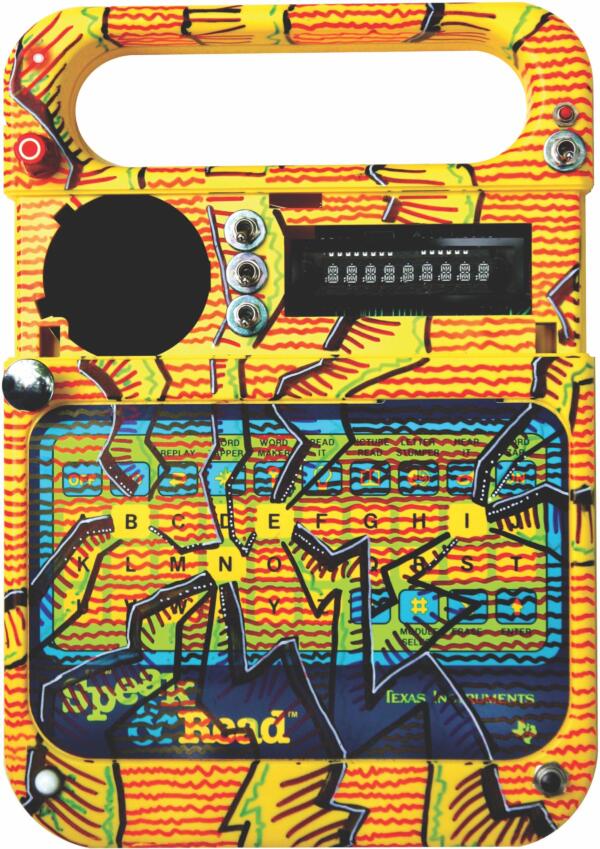1827 Sold on the human text
Art + DIY Electronics
by Garnet Hertz
Cambridge, MA: The MIT Press, May 30, 2023
$45.00 / 9780262044936 (paperback)
Reviewed by Thomas Girard
*
 Dr. Garnet Hertz new book on DIY culture – Art + DIY Electronics – is a refreshing change from typical academic texts. It has the heft, but without the intimidation of a work that appears as if it requires too much heavy lifting. It qualifies itself, bringing in sources and reference material that are inspiring, but also appropriate, yet it does it with a literary narrative quality that makes you want to read it. With my review copy, at first glance, I was intimidated. As I skimmed the pages deciding how I was going to sink my teeth in, I learnt that it was possible to skim it. I stopped now and then checking out the vibrant, diverse, inclusive images and engaging captions. I was sold: sold not on the idea that I could just skim it, but sold on the idea that I could and would want to return to it and all its parts, again and again. I was sold enough that I could eventually perhaps risk myself in saying it would enter my scholastic vocabulary.
Dr. Garnet Hertz new book on DIY culture – Art + DIY Electronics – is a refreshing change from typical academic texts. It has the heft, but without the intimidation of a work that appears as if it requires too much heavy lifting. It qualifies itself, bringing in sources and reference material that are inspiring, but also appropriate, yet it does it with a literary narrative quality that makes you want to read it. With my review copy, at first glance, I was intimidated. As I skimmed the pages deciding how I was going to sink my teeth in, I learnt that it was possible to skim it. I stopped now and then checking out the vibrant, diverse, inclusive images and engaging captions. I was sold: sold not on the idea that I could just skim it, but sold on the idea that I could and would want to return to it and all its parts, again and again. I was sold enough that I could eventually perhaps risk myself in saying it would enter my scholastic vocabulary.
Let me be clear: this was not my first introduction to Garnet’s work. We had chatted about his most recent skate park work, documenting and creating graffiti at a local skate park after work – after putting in the time in his prestigious and honourable appointment at Emily Carr University of Art and Design. We had talked about other artists doing similar things in similar places these days, notably artist Germaine Koh who is also in the DIY space in a way. We had talked about what he loves with his work, things like risograph printing, zines, and “making” in all forms. But we hadn’t dug in in the way this book does even at first glance, showing that he does the heavy lifting behind the ideas that you might think he just passes off in conversation, without really knowing. Let me be clear: he knows this stuff.

If I’m risking being too meta or contextual, I will anyway and say or acknowledge that this is an important work for this artist and academic. Garnet has certainly been anticipating and preparing for the release of this book. If you follow his everyday process, he is often talking informally about how he has been preparing to invest himself in the marketing and speaking about a book of this nature. He doesn’t shy away from the reality that this book is a key piece in his academic journey, which only stops now and then for things like Fulbright recognition and a Canada Research Chair appointment. Garnet is at the top of his game and yet this book is an important milestone for him.

At first glance, I noted the inclusion of references from India. I had already become acquainted with a school called Srishti in Bangalore, and was delighted to see it mentioned with pairing imagery in even a glance of the book. That was because it was not the only reference to other places. This work could have easily made its way through the appropriate content without sharing topics that might be other. It doesn’t take that often-taken safety net, and instead says ‘let’s include that, even highlight and care about that,’ perhaps to say it is inspiring for young academic readers who can now say even academic books these days care and invite change in the world.
There are few books that I care enough to read thoroughly in the academic realm of the art, design, and humanities spaces. This is one. It highlights the necessary materials for people with checklists and boxes to tick, but it does it in a deeply caring way. It has a kind of subtle humour that makes you want to meet the author. It is warm and familiar, and beautiful, and different enough that even if you wanted to get the material somewhere else, you wouldn’t be able to. But I’m certain, you wouldn’t want to anyway. This book aspires to be the authoritative text in this aspect of the DIY space, and with that it succeeds. But it is more than that, it is a human text, and that’s a value that needs a checkbox so badly: a checkbox that this book fills with every pencil, pen, and heart. Enjoy it, I did.

*

Thomas Girard (born 30 December, 1980 in Vancouver) is a Canadian scholar. Girard was accepted to attend the University of Oxford in lectures equivalent to graduate coursework. Girard has received several Emerging Scholar awards, first at the Design Principles and Practices conference in Barcelona at the prestigious ELISAVA. At Emily Carr University of Art and Design he received his second Emerging Scholar award. Other awards include RBC Emerging Scholar, Royal Bank of Canada Foundation. For 2021, he has been awarded an Emerging Scholar award from the New Directions in the Humanities conference in Madrid. He is a 2022 graduate of the Graduate Liberal Studies programme at Simon Fraser University. He will present “Advanced Typography Workshops in Quarantine” at the Sorbonne in late June 2023. Editor’s note: Thomas Girard has written three previous essays for The BC Review, User experience & Sophocles, Teaching typography in quarantine (also to be presented here) and Podiums, prototypes, and Plato. He has also reviewed a book by Ron Wakkary.
*
The British Columbia Review
Interim Editors, 2023-24: Trevor Marc Hughes (non-fiction), Brett Josef Grubisic (fiction)
Publisher: Richard Mackie
Formerly The Ormsby Review, The British Columbia Review is an on-line book review and journal service for BC writers and readers. The Advisory Board now consists of Jean Barman, Wade Davis, Robin Fisher, Barry Gough, Hugh Johnston, Kathy Mezei, Patricia Roy, Maria Tippett, and Graeme Wynn. Provincial Government Patron (since September 2018): Creative BC. Honorary Patron: Yosef Wosk. Scholarly Patron: SFU Graduate Liberal Studies. The British Columbia Review was founded in 2016 by Richard Mackie and Alan Twigg.
“Only connect.” – E.M. Forster
5 comments on “1827 Sold on the human text”